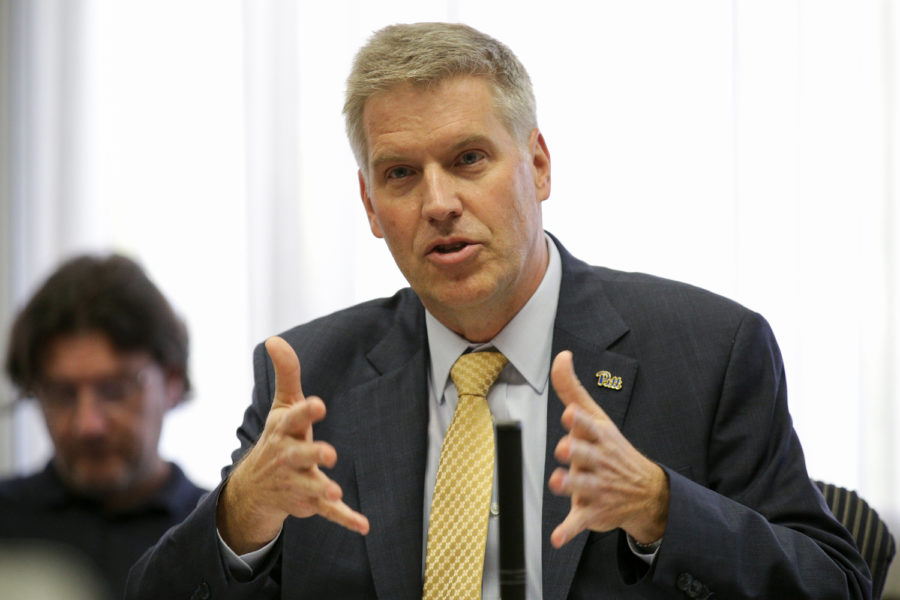Gallagher provides updates on University initiatives
Chancellor Patrick Gallagher addressed the University’s admission process in relation to the FBI’s Operation Varsity Blues at the most recent board of trustees meetings.
June 28, 2019
After its last meeting in February, where new student financial aid programs were announced, Pitt’s Board of Trustees tackled several important issues facing the University at its Friday meeting in the William Pitt Union.
After voting to confirm several new trustee appointments and a new chairperson-elect, Chancellor Patrick Gallagher provided updates about several key University initiatives such as the annual budget and financial aid programs.
Pitt’s annual appropriations bill, passed this week by both houses of the General Assembly, is now heading to Gov. Tom Wolf’s desk for approval.
Gallagher said the funding bill was a “very positive outcome” for Pitt and expects the University budget to completed on time in July.
“We do continue to fight hard for the Commonwealth to increase their support,” Gallagher said, “because this support from the Commonwealth directly benefits Pennsylvania residents who go to school at Pitt.”
The bill includes a 2% funding increase for the University, significantly less than the 6.5% increase requested by Pitt, creating a $20 million budget hole.
In an interview after the meeting, Gallagher said tuition rates would not be higher than what was projected in the University’s original budget request, which includes a 3% hike for in-state students and 5% bump for out-of-state students.
“They won’t be any higher than that, obviously, than what we were projecting,” Gallagher said. “I think we can do better, but it’s probably too [premature] for me to be opining on a number yet.”
The General Assembly also passed a bill this week creating the Public Higher Education Funding Commission, a body tasked with creating a unified funding formula to tame the Commonwealth’s current disparate higher education funding structure. Pennsylvania had a similar group, the 15-member Basic Education Funding Commission, from 2014 to 2015, which recommended a formula for how to distribute state funding to K-12 school districts.
At a February hearing in Harrisburg, Gallagher said he was open to the idea. He cautioned Friday, in an interview after the meeting, that the commission should focus on changing the underlying funding policy, or a new formula could present an opportunity to “deflect” the issue.
“They’re still gonna have to, sort of, establish priorities, and overall, setting aside our specific interests, that’s a good thing for the Commonwealth to do,” Gallagher said. “I hope what they do is tackle the broader questions about prioritization of these resources.”
In his presentation to the board, Gallagher provided an update about the University’s admissions for the incoming class of 2023.
Gallagher said it was a “strange” year for the admissions process, referencing the FBI’s Operation Varsity Blues which caught many rich Americans engaging in admissions fraud for their children to attend elite universities. He mentioned Pitt evaluated its own admissions processes with the risk and compliance committee of the board of trustees and did not find any similar issues.
“It’s hard to remember a time when admissions issues have been at the forefront of the national attention and the national policy debate the way they are today,” Gallagher said. “We have been recruiting our next incoming class at one of the most tumultuous times, when people are asking hard questions about our process and our integrity and the affordability of our institution.”
The class is also potentially the most racially/ethnically diverse first-year class on record, according to the University, with nearly 33% of students being underrepresented minorities. The class also includes 636 Pell grant recipients, an additional 100 students, or 18.7% increase, compared to the previous year.
But Gallagher also said while net tuition is up, financial aid is the fastest growing expense in the University. The investment committee of the Board of Trustees voted Monday to divert $7.5 million from one of Pitt’s quasi-endowment funds to help pay for financial aid for Pitt students.
“We believe that this addressing need is now increasingly being associated with quality.” Gallagher said. “Universities are being addressed by their ability to address social mobility.”
Gallagher also spoke about the strength of Pitt’s research programs. He cited several metrics as evidence for the University’s accomplishments, touting a 128% increase in the number of startups — 73 formed between 2015-19 versus 32 from 2010-14 — and a 46% increase in the number of patents issued — 357 from 2015-19 versus 244 from 2010-14.
Gallagher touched upon Pitt’s efforts to connect with other universities globally — a “powerful statement,” with over 2,100 students participating in study abroad programs, setting a new record. But he also mentioned the complex interplay of national security in the University’s research programs.
Gallagher said he was disturbed by the trend of apparent targeting of certain ethnic groups — such as the recent oustings of Chinese-American scientists by the National Institutes of Health — but remained committed to creating an inclusive and diverse research environment.
“We will not manage this by nationality, ethnicity, country of origin,” Gallagher said. “We will manage this by behavior and people following the rules and doing the appropriate things.”
Gallagher added that the University would try to do things the “right way.”
“It just comes down to a very simple reason,” Gallagher said. “If we’re here to make the world a better place through knowledge, then we have to understand that that’s a global activity.”








